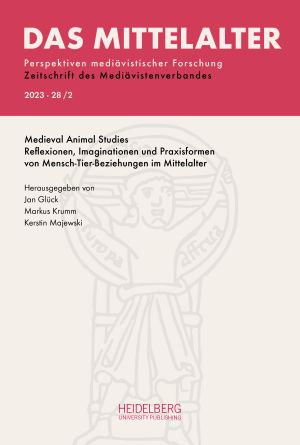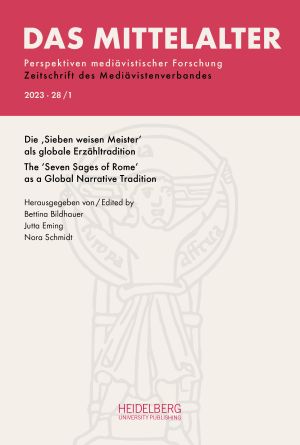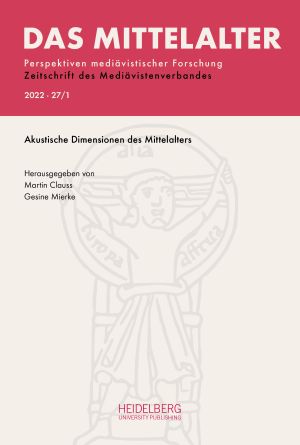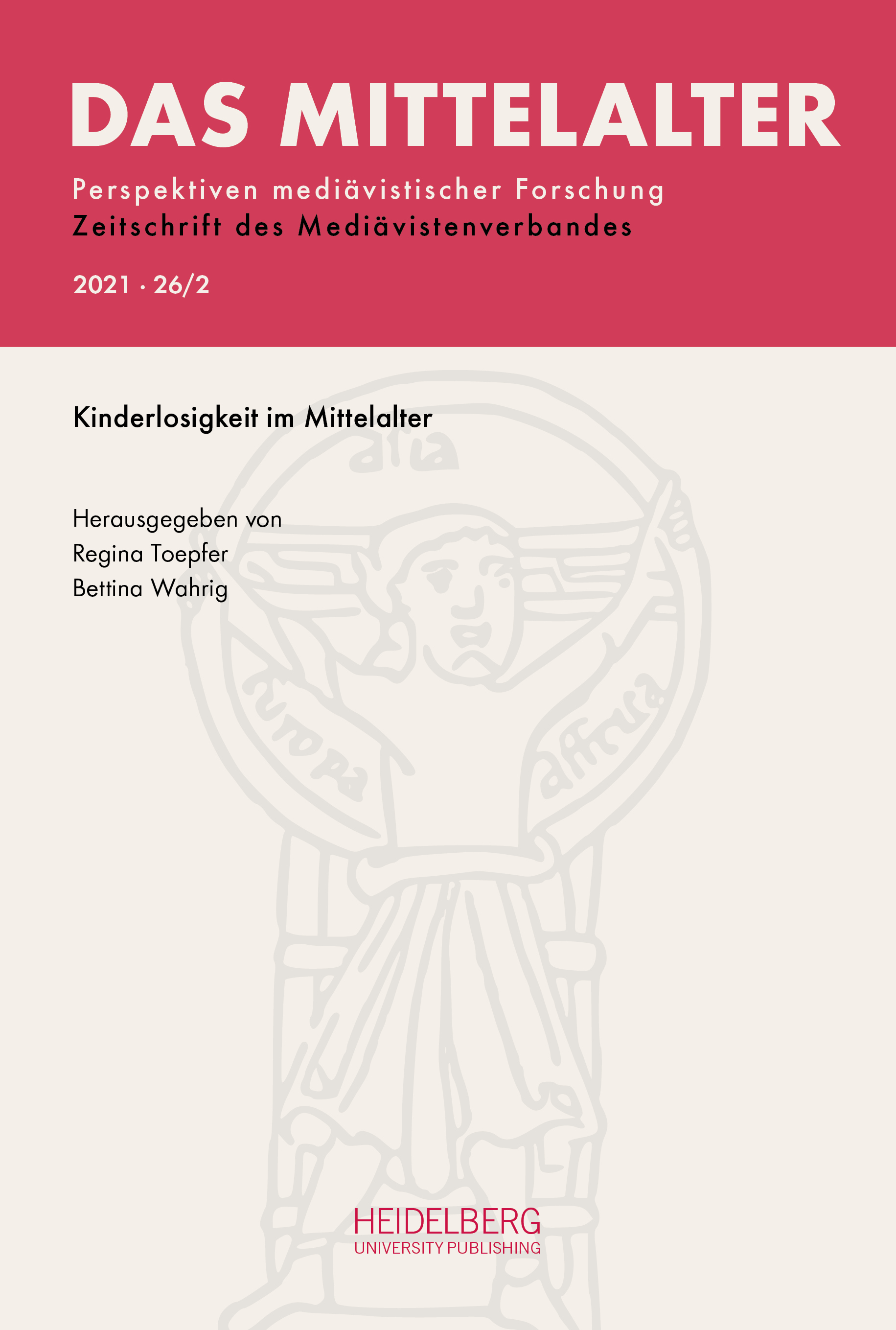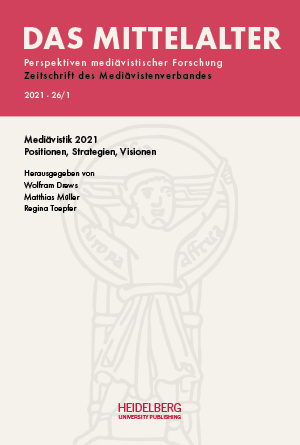Archiv
Bd. 30 Nr. 2 (2025)
Das Themenheft zu ‚Sexualitäten im Mittelalter. Normen und Devianz, Phantasien und Praktiken‘ fokussiert, wie vormoderne Gesellschaften Sexualität beschrieben, regulierten und imaginierten. Die Beiträge beleuchten interdisziplinär und exemplarisch Diskurse aus Theologie, Medizin, Recht, Hagiographie, Literatur und bildender Kunst, in denen Vorstellungen von Norm und Abweichung, Begehren und Körperlichkeit verhandelt wurden. Anhand bekannter wie neu erschlossener Quellen zeigen sie die Vielgestaltigkeit sexueller Ordnungen und Praktiken und eröffnen neue Perspektiven auf Macht, Geschlecht und soziale Strukturen.
Bd. 30 Nr. 1 (2025)
Das Themenheft widmet sich der computationell arbeitenden Mittelalterforschung in ihrer verbindungsstiftenden Funktion. Als Schnittstelle vermittelt sie zwischen den Disziplinen, Digitalem und Analogem, heterogenen Forschungsgegenständen und vielfältigen Methoden. Dabei integriert sie nicht nur Ansätze und Wissen aus anderen Fachbereichen, sondern trägt auch zum Erkenntnisgewinn über ihre eigene Disziplin hinaus bei. Das Ziel des Bandes ist, kollaborative Verfahren der Digital Humanities forschungsorientiert und praxisnah vorzustellen und die hierfür angewandten Methoden und Praktiken zu evaluieren und zu diskutieren.
Bd. 29 Nr. 2 (2024)
Während die Mediävistik den Phänomenen Geburt und Tod seit langem große Aufmerksamkeit widmet, legt dieses Themenheft den Fokus erstmals auf die enge Verbindung der beiden Phänomene im Ideen-, Erfahrungs- und Handlungsrepertoire des Mittelalters. Unter Rückgriff auf Theorien der Übergangsriten und der Liminalität untersuchen die versammelten Studien die Symmetrie von Geburt und Tod in literarischen, religiösen, sozialen und medizinischen Konzepten und Praktiken. Die Untersuchungsgegenstände reichen von Strategien im Umgang mit dem hohen Sterberisiko während Schwangerschaft und Geburt über Bestattungsformen und Grabbeigaben bis hin zur Rezeption der fernöstlichen Reinkarnationslehre im spätmittelalterlichen Europa.
Bd. 29 Nr. 1 (2024)
Meteorologische Phänomene waren im Mittelalter nicht nur ständige Begleiter des Menschen: Wind, Regen, Blitze und andere atmosphärische Phänomene konnten über die Existenz und das Überleben von Individuen wie von Gemeinschaften entscheiden. Nicht zuletzt die Tatsache, dass derartige Phänomene als Ergebnis einer Verschränkung zwischen der sichtbaren Realität der „Meteore“ mit den weniger sichtbaren kosmologischen Strukturen des Universums verstanden wurden, bewegte die Menschen des Mittelalters dazu, meteorologische Phänomene eingehend zu erkunden. Dieses Themenheft versammelt eine Reihe interdisziplinärer Beiträge aus dem Bereich der Mediävistik, die zeigen, wie die Phänomene des Himmels in verschiedenen Kulturen Ausgangspunkt zur Theoriebildung waren.
Bd. 28 Nr. 2 (2023)
Wie positioniert sich die interdisziplinäre Mediävistik zu aktuellen Entwicklungen der ‚Animal Studies‘? Welches Potential haben die Methoden, Theoreme und kritischen Reflexionen der ‚Animal Studies‘ für die Analyse mittelalterlicher Quellen? Und welchen Beitrag können dezidiert mediävistische ‚Animal Studies‘ zu den zeitgenössischen Diskussionen und Konzeptualisierungen leisten? Im Horizont dieser Fragestellungen fokussieren die Studien des Themenhefts aus unterschiedlichen fachwissenschaftlichen Blickrichtungen Reflexionen, Imaginationen und Praxisformen von Mensch-Tier-Beziehungen im Mittelalter und tragen zu einer Historisierung der Konzepte gegenwärtiger ‚Animal Studies‘ bei.
Bd. 28 Nr. 1 (2023)
Das Themenheft stellt einen der am weitesten verbreiteten Erzählstoffe der Vormoderne in den Mittelpunkt: die ‚Seven Sages of Rome‘ oder ‚Sieben weisen Meister‘. Aus der Zeit vom 11. bis zum 19. Jahrhundert lassen sich im vormodernen Asien, Europa und Nahen Osten Versionen in 30 Sprachen nachweisen, die seine große Bekanntheit belegen. Doch dies ist in der Mediävistik wenig bekannt und wird kaum thematisiert. Die Herausgeberinnen vertreten die Auffassung, dass der Stoff in herausragender Weise geeignet ist, um aktuelle und interdisziplinär relevante Ansätze der Mediävistik und Frühneuzeitforschung aufzugreifen und zusammenzuführen. Dazu zählen Aspekte der Überlieferung, der globalen Literaturgeschichtsschreibung und der Intersektionalitätsforschung.
Bd. 27 Nr. 2 (2022)
Dieses Themenheft gibt einen Überblick über die Diversität von Sachüberlieferungen mittelalterlicher Schuld- und Kreditbeziehungen in Zentral-, Nord- und Südosteuropa. In neun Fallstudien wird die Bedeutung verschiedenartiger Artefakte wie Kerbhölzer, Pfandgegenstände, Rechnungslisten oder Briefe für Kreditbeziehungen in unterschiedlichen mittelalterlichen Gesellschaften beschrieben. Es wird gezeigt, dass Kredite auf keine bestimmte ökonomische oder soziale Gruppe beschränkt waren. Unter Anwendung multidisziplinärer Zugänge, etwa aus der Archäologie, Philologie, Judaistik oder Germanistik, werden neue Aspekte des mittelalterlichen Wirtschaftens rekonstruiert, die bisher nur peripher wahrgenommen wurden.
Bd. 27 Nr. 1 (2022)
Dieses Heft nimmt sich aus unterschiedlichen fachlichen Perspektiven verschiedener akustischer Dimensionen der Literatur, Historiographie, Musik und Kunst des Mittelalters an. So gerät ein bislang wenig beachteter Aspekt der Epoche in den Fokus. Die behandelten Themen reichen von den Klängen des Olifants über das Schweigen der Mystik bis hin zu spätmittelalterlichen Kanzeln.
Bd. 26 Nr. 2 (2021)
Kinderlosigkeit wird im Mittelalter in zahllosen Quellen als Problem thematisiert, das mit medizinischen, religiösen und sozialen Strategien bewältigt werden soll. Die gesellschaftlichen Folgen von Unfruchtbarkeit konnten besonders für Frauen gravierend sein, doch gab es auch Menschen, die sich bewusst für ein Leben ohne leiblichen Nachwuchs entschieden. Das Heft rückt vom Allgemeinplatz alles beherrschender Normen von Heirat und Nachkommenerzeugung ab und setzt das vermeintliche Randthema der Kinderlosigkeit in den Fokus mediävistischer Forschung. Es belegt in acht interdisziplinären Detailstudien die Komplexität, Diversität und Pluralität historischer Gender-, Körper- und Familienkonzepte.
Bd. 26 Nr. 1 (2021)
Der Mediävistenverband nimmt den digitalen Wandel seiner Zeitschrift zum Anlass, nach dem Stand der Mediävistik im Jahr 2021 zu fragen und programmatisch Zukunftsperspektiven zu entwickeln. Fächerübergreifend beschäftigen sich Präsidium und wissenschaftlicher Beirat mit zentralen wissenschaftlichen, hochschulpolitischen und gesellschaftlichen Themen. In sechs Strategiepapieren wird über die Relevanz der Mediävistik, die Problematik des Mittelalterbegriffs, das Dilemma junger Forschender, die Herausforderungen der Wissenschaftskommunikation, die Methoden digitaler Mediävistik und die Vor- und Nachteile der Verbundforschung diskutiert. Ergänzt werden diese interdisziplinären Beiträge durch fachspezifische Stellungnahmen, die das gesamte Spektrum der Mediävistik – von Anglistik und Archäologie bis Skandinavistik und Theologie – umfassen und auch das Verhältnis zur Schule berücksichtigen. Mit einem Fokus auf digitalen Neuerscheinungen wird die Open-Access-Strategie des Verbands auch im Rezensionsteil konsequent umgesetzt.




